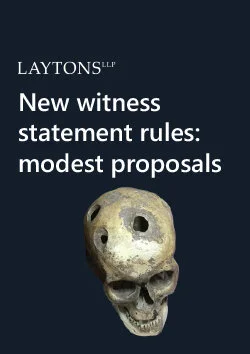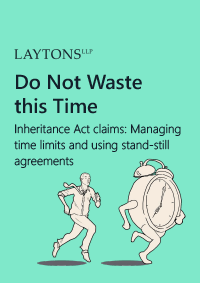Disputes | Competition Law
We can advise on the Competition Law aspects of:
- Claims — we are experienced in bringing and defending civil claims based on Competition Law. We can advise you on the impact of Article 101 of the European Union, which prohibits certain agreements which prevent, restrict or distort competition, and Article 102, which prevents abuse of a dominant position within the common market or in a substantial part of it. We can advise you on the equivalent domestic legislation in Chapters I and II of the Competition Act 1998
- Complaints and investigations — we can assist in advising on and preparing documentation to make a complaint to, or respond to, an investigation by the UK Competition Authorities or the European Commission (DG Competition) or other national competition regulatory authorities
- Cartels — we can advise on all aspects, including as to “whistle-blowing”, national and international investigations, and claims by those adversely affected by cartels
- Commercial agreements — we can draft and negotiate your commercial agreements, such as agency and distribution contracts, so as to avoid infringing national and international competition law
- Mergers and acquisitions
Related Expertise
Our Team
News & Insights
The recently launched Legal 500 and Chambers & Partners legal directories have recognised Laytons LLP for a number of key services across London, Manchester and Guildford including Corporate & Commercial, Dispute Resolution, Commercial Property, Family and Property Litigation services.
Internet users cannot simply copy a photograph posted, without any restriction preventing it from being downloaded and posted with the copyright holder’s consent, on one website and republish it on another website.
It seems Dr Dre took a chronic dislike to the prospect of Dr Drai securing a registered trademark for his phonetically similar trading name on grounds that it would cause confusion.
Dulwich Hamlet Football Club is fighting a battle to continue to play football at its Champion Hill ground, but it cannot have expected to face a fight to use its 125-year-old name.
A team of 10 runners from Laytons LLP took on the challenge of Run the River, a major charity event that criss-crosses the Thames.
Toblerone has tempered Poundland’s launch of its rival “Twin Peaks” chocolate bar by threatening infringement action.
Resellers need to tread a careful line when using a brand owner’s marks. Use by an independent garage of BMW’s marks crossed the line between informative use (which is permitted) and misleading use (which is not).
In the latest round of the long running skirmish between confectionary giants Nestlé and Cadbury, Nestlé has lost its appeal to secure trade mark protection for the shape of its four-finger Kit Kat bar.
Hotel California, a small but apparently lovely Mexican hotel established in 1950, denies the Eagles’ “baseless” claims it infringes rights in the famous 1976 album and song of the same name.
Aggrieved rights holders' thoughts turn to sharply worded cease and desist notices aimed at stopping infringement or paving the way to court action. Rights holders need to take care before making threats.
With six specialist lawyers providing expert advice, we offer a highly experienced, partner-led, cost-effective service. We aim to resolve disputes quickly and pragmatically, to achieve the best outcome for all our clients.
Following the Russian invasion of Ukraine in February 2022, the UK government imposed broader and stricter financial and trade sanctions against Russian nationals and businesses “for the purposes of encouraging Russia to cease actions which destabilise Ukraine, or undermine or threaten the territorial integrity, sovereignty or independence of Ukraine”.
The English court has recently sanctioned a scheme of arrangement in respect of a company incorporated in the Cayman Islands. The court had to consider whether the company concerned had a sufficient connection with this jurisdiction to enable the court to sanction the scheme and consider the impact of the Russian sanctions on certain classes of creditors.
Richard Harrison looks at how those involved in Court proceedings in England might work around an irritating, frustrating and certainly expensive new development.
A new Practice Direction (57 AC) has been introduced dealing with witness statements for trial in the majority of proceedings in the Business and Property Court. This article looks at some of the issues.
Brexit has not gone away and it is not at all certain that a deal will be done before the end of the transition period on 31 December. We explain the implications of a no-deal Brexit on commercial contracts and provide practical steps that a business should take to protect from the risks.
In the current unprecedented and uncertain circumstances of the coronavirus induced economic and social lockdown, canny lawyers need to be able to advise from both sides. They may be instructed at different points in a supply chain and have to deploy apparently inconsistent arguments.
A receiver is an individual (or those acting jointly) appointed by a creditor that holds a charge over the assets of a debtor to take custody of the charged assets, manage those assets and receive the income from them. Usually, a receiver will also have the power to sell the assets and to apply the proceeds of sale in satisfaction of the secured debt.
The Inheritance (Provision for Families and Dependants) Act 1975 (“the Inheritance Act”) enables some limited exceptions to the principle of testamentary freedom and provides an option for redress for those dissatisfied with the dispositions made to them in a will.
Successful challenges to arbitral awards are rare. The case of K -v- A [2019] EWHC 1118 (Comm) is one of those highly rare cases where a Gafta Award was subject to a successful challenge.





































